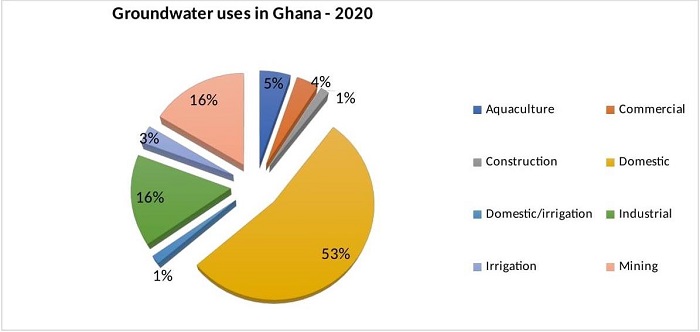Wednesday, March 22 is World Water Day (WWD) 2022 and Ghana is joined the international community to celebrate this Day, which marks the 29th commemoration since it was first observed in 1993. WWD was instituted by the UN General Assembly as a means of focusing attention on the importance of freshwater and advocating for the sustainable management of freshwater resources.

This year’s theme: “Groundwater – Making the invisible Visible”, is a wakeup call on mankind to redirect attention to this essential global resource that provides the largest store of freshwater, apart from the world’s ice caps.
Ground water is simply water obtained from below the earth’s surface. However, although, it’s hidden below the earth’s surface, thus making this resource invisible, groundwater makes up 99% of earth’s liquid fresh water, according to the Canada based “Groundwater Project.”
Groundwater plays an important role in the water cycle, such that rivers, lakes and wetlands are its surface manifestations. There is a synergy between the two: as surface water resources exchange flow with the groundwater reservoir that feeds them when they need water. Groundwater takes some of the flow of surface water when it is present in excess, especially during excessive rains and floods.
Global Importance of Groundwater
Groundwater is a vital water supply for humanity, providing drinking water entirely or in part for as much as 50% of the global population and accounts for 43% of all of water used for irrigation. It is a comparatively safe and reliable natural resource, which can often be found close to the final consumers. It does not require large investments in terms of infrastructure and treatment, as it often is necessary, when harvesting surface water.
It is therefore no wonder that at least two billion of the world’s 7.6 billion people, depend exclusively on groundwater as their primary source of water to meet their basic daily water needs through wells and boreholes.
Additionally, groundwater also controls many features on the earth’s surface. The depth of the water table is said to be partly responsible for different plant species occupying different positions along the slopes from hills to valleys. Also, the dissolution of carbonate rocks by flowing groundwater creates caves and sinkholes. Then in desert environments, groundwater discharge forms oasis, which provide habitats for animals and plants.
Importance of Groundwater in Ghana
Ghana’s Water Policy identifies underground water as one of the major sources of water in the country, with several advantages over surface water for the provision of water supply. The Policy notes that groundwater is used as the first choice among other options for community water supplies, whenever it is available. This is because it is more reliable throughout the year and in periods of drought, and generally does not require treatment, is relatively inexpensive and provide a good basic service.
It is for these reasons that Ghana’s Community Water and Sanitation Agency (CWSA) depends solely on underground water to fulfill its mandate of providing safe and accessible water to small towns and rural communities. CWSA’s Head of Extension Services, Mrs. Theodore Adomako, says in their work, groundwater is very important because, “it serves the unreachable, it’s affordable, cost of maintenance is low and it generally requires low investment,” adding, “ground water is safe water as against the use of streams and rivers.”
Even in the urban areas, groundwater plays an important role in the supply of water mainly to the pipe borne water unreached populations. It is estimated that groundwater contributes about 62% of the total water requirement of Ghana, while contributing an average of 67% to Northern Ghana’s domestic water needs. Overall, around 41% of households in Ghana depend on groundwater for their water supply.
The uses of groundwater in Ghana are many and different covering livestock and mineral/bottle water production, with domestic use being the highest. In 2020 domestic water use comprised 53% of groundwater uses, while other uses such as aquaculture was only 4% and irrigation 3% as indicated in the following pie chart sourced from the Water Resources Commission (WRC).

Threats to Groundwater
Like other natural resources including plants, wild animals and pollinators such as bees, groundwater sources continue to face many threats. Results from a 2020 global groundwater quality assessment, noted three major threats to ground as anthropogenic or human induced contaminants, naturally occurring contaminants and climate change.
The assessment report titled “Assessing Groundwater Quality: A Global Perspective,” identified the sources of anthropogenic contaminants of ground water as mainly being the effects of agricultural intensification, urbanisation and population growth. The Report further identified the major contaminants as including “salinity, nitrate pollution, microbiological contamination, manufactured contaminants, pesticides, non-aqueous phase liquids, and organic contaminants of emerging concern.”
Clearly, the continuous use of some agrochemicals, improper treatment and disposal of solid and liquid waste including human faeces as well as discharge into the environment of untreated industrial waste are polluting and threatening underground water resources. The report also highlighted excessive abstraction of groundwater as another major threat.
The report was produced by the International Groundwater Resource Assessment Centre (IGRAC) in collaboration with the Friends of Groundwater (FoG), as part of the World Water Quality Alliance (WWQA) and United Nations Environment Programme (UNEP)’s plan towards a future global assessment of groundwater quality.
It calls for climate change to be considered as a major element, whenever groundwater quality assessment is being done, “since rising sea levels have a significant impact on coastal groundwater resources via coastal flooding and accelerated seawater intrusion.”
The report acknowledges the localised nature of the threats, especially pollution sources, meaning pollution impacts on wells are often site-specific and therefore require localised solutions.
Generally, in Ghana, the potential for increasing groundwater uses is faced with challenges including salinity, dry wells or boreholes syndrome, increasing pollution from refuse dumps, latrines and unprotected abandoned hand-dug wells as well as the uneven distribution of ground water resources in Ghana.
The Head of Environmental Quality at the WRC and Convener of the Planning Committee for the national celebration of World Water Day, Adwoa Paintsil, sees other groundwater management and development associated challenges as water quality issues, improper drilling of boreholes, proliferation of water well drilling activities, illegal drilling and groundwater abstraction.
In an interview, she also mentioned other challenges as lack of standards in water well drilling to ensure maximum protection of groundwater resources, limited information available on water well drilling activities for future referencing, and inadequate/unreliable groundwater data and information needed for assessment, future planning and effective management of groundwater resources.
Groundwater Regulations and Legislation in Ghana
There exists in Ghana regulations and legislation aimed at managing and developing the nation’s ground water resources. Explaining the status of ground regulations, the Head of Planning at WRC, Bob Alfa, said in line with its mandate outlined in Section 35 of the Water Resources Commission Act (Act 522 of 1996), the WRC sponsored the Drilling Licence and Groundwater Development Regulations, 2006 LI 1827. The LI was passed by Parliament in 2006.
He was addressing the Media and Policy Dialogue held on Tuesday March 15, 2022, as part of activities marking national celebration of this year’s World Water Day. He said LI 1827 is purposely “to provide licences to companies that prospect for and drill water wells; regulate in an environmentally sustainable manner the development of Ghana’s groundwater resources; and gather information on the groundwater resources.”
Mr. Alfa stated that under Regulation 23 of LI 1827 “it is an offence punishable by law to work as or engage an unlicensed driller.”
As part of the national celebration of 2022 WWD, a training session on the theme: “Exploring Underground Water Resources for Multiple Uses,” was organised on Thursday, March 17, 2022, for drillers in Accra. The climax activity was a grand durbar at Dodowa near Accra.
By Ama Kudom-Agyemang
